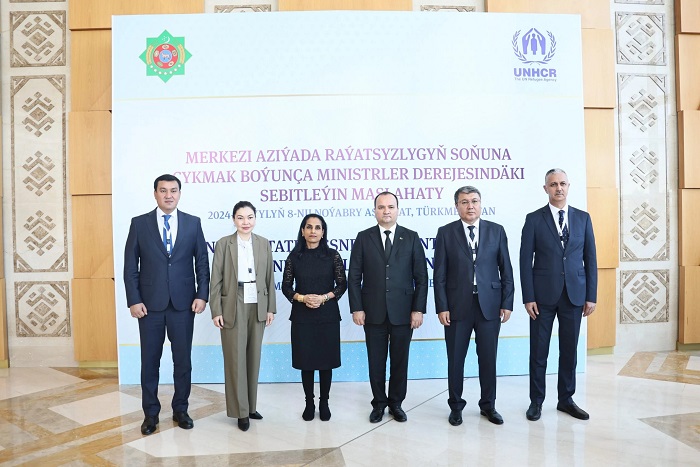ALMATY – Central Asian States have reaffirmed their commitment to eradicate statelessness, adopting the Ashgabat Declaration on Ending Statelessness in Central Asia, published today in Kazakh, Kyrgyz, Tajik, Turkmen, Uzbek, Russian and English languages.
Adopted by the Republic of Kazakhstan, the Kyrgyz Republic, the Republic of Tajikistan, Turkmenistan and the Republic of Uzbekistan, the Ashgabat Declaration highlights eight strategic directions to sustain and build on the progress achieved across the sub-region to reduce and prevent statelessness.
The Declaration is a key outcome of the Ending Statelessness in Central Asia Ministerial Conference, co-convened by the Government of Turkmenistan and UNHCR, the United Nations Refugee Agency, in Ashgabat on 8 November 2024.
“This milestone highlights the impact of strong political will and regional collaboration in addressing statelessness,” said Dumitru Lipcanu, acting UNHCR Representative for Central Asia. “By working together to implement the Ashgabat Declaration, we move closer to a future where every person enjoys the rights and security that come with citizenship, and can fully contribute to the sustainable development of their communities.”
Over the last decade, Central Asia has made significant progress in reducing and preventing statelessness, supporting more than 200,000 people to confirm or acquire a nationality. One in every three cases of statelessness resolved worldwide is in Central Asia.
The Kyrgyz Republic and Turkmenistan are the only countries in the world to resolve all known statelessness cases on their territories.
Through the new declaration, States support:
- Enhancement of Statelessness Determination Procedures
- Facilitation of cross-border confirmation of nationality
- Reduction of remaining stateless populations
- Promotion of regional cooperation and best practices
- Strengthening data collection and transparency
- Alignment with international standards and conventions
- Support for birth registration and legal identity for all children
- Inclusion of stateless people into national systems
As of October 2024, over 30,000 people were known to be stateless or with undetermined nationality across Central Asia. Without citizenship, they often have difficulty accessing basic rights such as education, healthcare, employment and freedom of movement. As only States can grant or confirm nationality, the cooperation of governments in preventing and reducing statelessness is crucial.
Building on the concrete gains and momentum of the #IBelong campaign, efforts and commitments to address statelessness will continue under the Global Alliance to End Statelessness, launched by UNHCR on 14 October 2024. Turkmenistan has shown international leadership, becoming the first country in Central Asia to join the new Alliance.
Turkmenistan is the only country in Central Asia that is party to the two UN Statelessness Conventions – the 1954 Convention Relating to the Status of Stateless Persons and the 1961 Convention on the Reduction of Statelessness. ///UNHCR Central Asia, 18 December 2024
